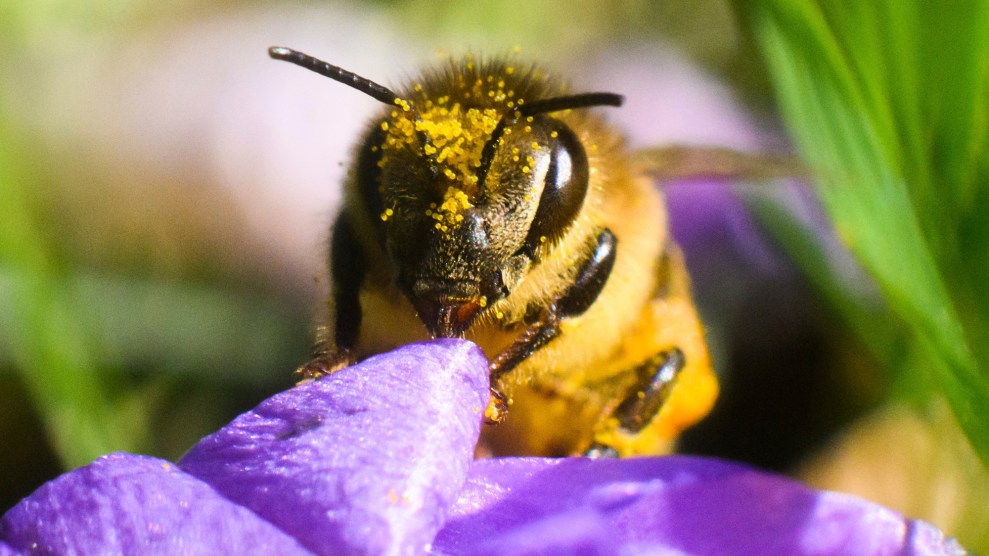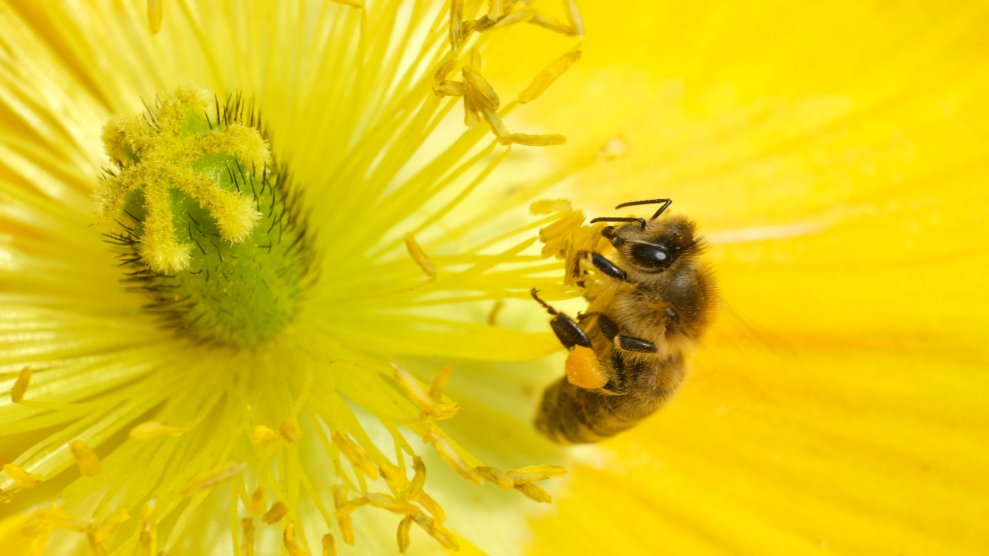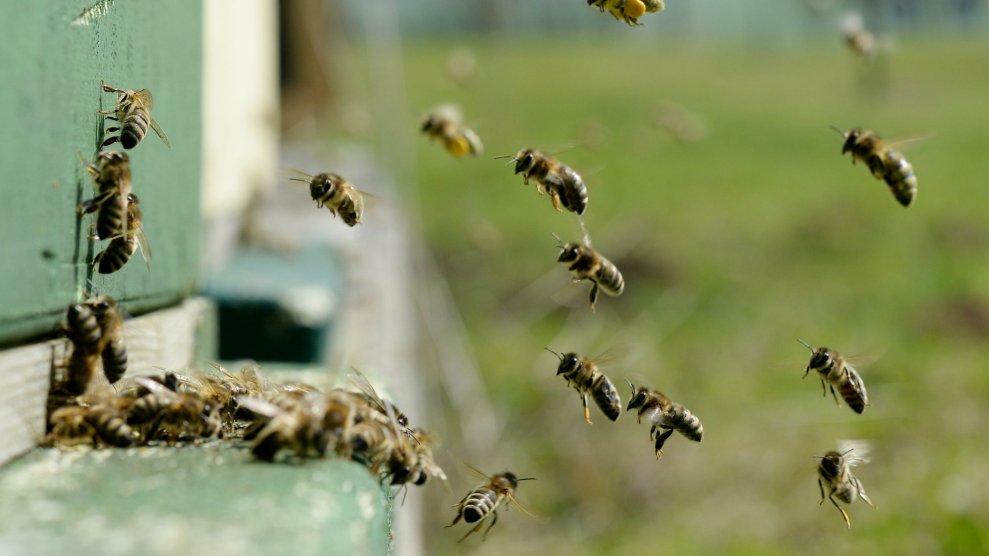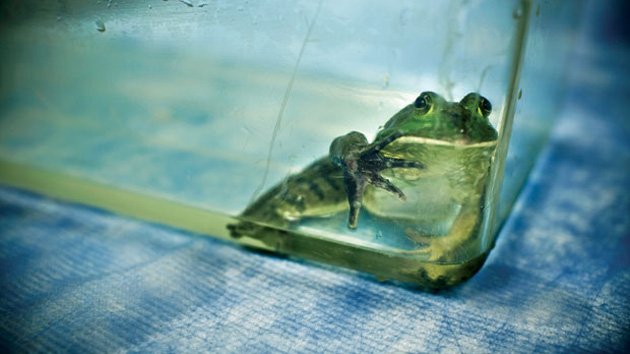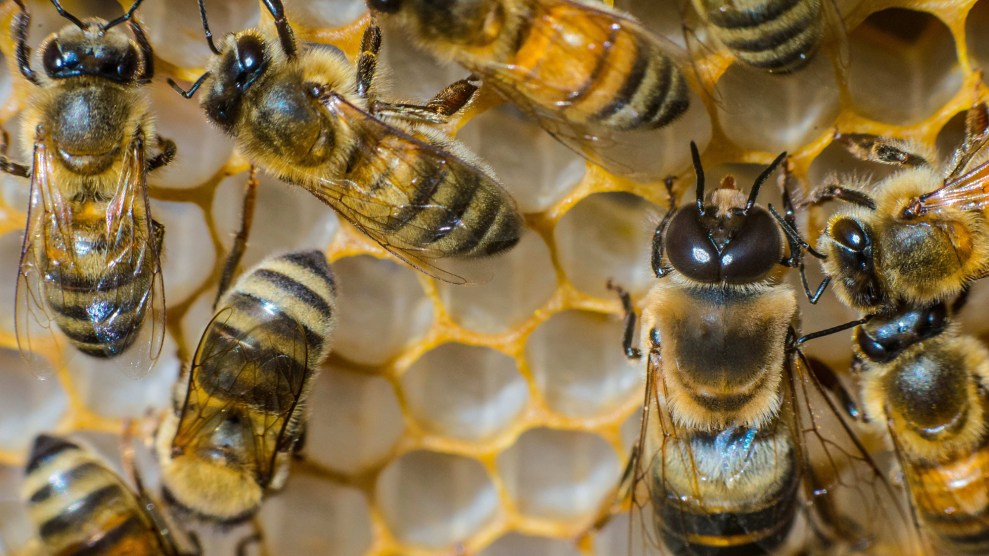
Preston Keres/ Zuma.
This story was originally published by the Guardian and is reproduced here as part of the Climate Desk collaboration.
The US Environmental Protection Agency is poised to allow the use of four of the most devastating chemicals to bees, butterflies and other insects to continue in America for the next 15 years, despite moves by the European Union to ban the use of toxins that have been blamed for widespread insect declines.
The EPA is widely expected to confirm a proposed plan outlined last year that will extend the use of imidacloprid, thiamethoxam, clothianidin and dinotefuran on US farmland for the next 15 years, even though the agency has noted “ecological risks of concern, particularly to pollinators and aquatic invertebrates.”
These four insecticides are all types of neonicotinoids, a class of chemicals that is widely used on crops to treat them for pests but has been found to cause devastation among non-target insects, such as bees. The chemicals assault receptors in an insect’s nerve synapses, causing uncontrollable shaking, paralysis, and death.
Neonicotinoids are used across 150 million acres of American cropland, roughly the size of Texas, and have contributed to the land becoming 48 times more toxic than it was a quarter of a century ago. The chemicals are water soluble and quickly leach out of plants into soils and streams, causing such harmful impacts to wildlife that Canada has restricted their use while the EU has banned the outdoor deployment of clothianidin, imidacloprid and thiamethoxam.
But while states such as Connecticut and New Jersey have enacted some curbs on neonicotinoids, the US government is set to bend to pressure from farming groups and pesticide makers to perpetuate their use nationally. “We are already seeing crashes in insect numbers and we don’t have another 15 years to waste,” said Nathan Donley, environmental health science director at the Center for Biological Diversity. “It’s frustrating to see the EPA go down this path. We really are at a crossroads—we can follow the science and the rest of the world or we can go out on our own and appease the chemical industry.”
An EPA spokeswoman said that review decisions for the neonicotinoids will be issued in “late 2022” and that mitigation rules for their use are being considered. “We understand the importance of pollinators for healthy ecosystems and a sustainable food supply,” she said, adding that the EPA “is working aggressively to protect pollinators, including bees.”
An outright ban, similar to the EU, appears unlikely for the US, however. “While the agency reviews the regulatory efforts of the EU, EPA also looks at regulation in countries such as Australia, Canada, Japan, New Zealand, and others that share our risk-based approach to regulation,” said the spokeswoman. “The differences in the details of our underlying laws can naturally lead to different regulatory conclusions.”
The use of neonicotinoids, hailed by industry as a key to bumper crop yields, has exploded since the 1990s. The chemicals are sprayed directly on to fruit and vegetables but are most commonly found embedded in the coating of corn and soybean seeds sold by companies such as Bayer and Syngenta to farmers.
Only a small fraction of the insecticide stays within the growing plant, however, instead seeping into pollen, water, and soils where insects are exposed to it. Researchers have found that the cognitive functions of bees are scrambled by the chemicals, making them unable to find their way to their hives, while affected beetles stagger around as if drunk.
Neonicotinoids also harm birds, studies have shown, while their benefits are questionable, with crop yields in many cases not improved by the indiscriminate use of the chemicals.
“These insecticides are not helping the productivity of crops on fields—it seems an amazing effort to blanket all these acres with something that doesn’t have a return on investment,” said John Tooker, an entomologist at Penn State University. “These seeds are marketed so well to farmers that they become scared they will have a catastrophic outbreak of pests if they don’t use them, even though this is unlikely. It has contributed to this toxic landscape across the country.”
The application of pesticides, along with habitat loss and climate change, has been cited as the main causes of spectacular insect declines recorded in the US as well as several European countries. Worldwide, it is estimated that insect populations are dropping by as much as 2 percent a year, with the United Nations warning that half a million species could be wiped out this century.
Tooker said that neonicotinoids, if used judiciously, can be useful but that their ubiquity has contributed to insects’ woes. “It’s difficult to dismiss the increasing toxicity in the landscape and think it’s doing nothing to insect populations,” he said. “These are the most powerful insecticides ever produced. We are just making insects’ lives harder in every possible way.”
Environmental groups, meanwhile, have launched a legal effort to force the EPA to regulate neonicotinoid-coated seeds and have urged the agency to reduce the number of “emergency” permits issued to states that request the spraying of the chemicals beyond what is normally allowed without a full review process.
The EPA is considering allowing farmers in Florida to spray clothianidin on 125,000 acres of citrus crops, including oranges, grapefruits, and lemon, which would be the ninth consecutive year such an emergency request has been granted.
“It defies all logic to say an emergency has been going on for nine years, the process has been clearly abused,” Donley said. “The science is so conclusive that these chemicals are harmful to the environment that this emergency exemption process is being used as a backdoor approval that goes on forever.”
“We need an administration that is willing to think about reform and challenge the status quo and we haven’t seen that with the Biden administration,” he adds. “It is certainly better than Trump but there is a lot of disappointment at the lost opportunity for change.”
